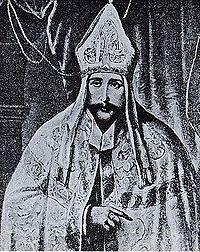Pietro Bonomo
Pietro Bonomo (also called Peter Bonomo , Petrus Buonomo or Pietro Buonuomo ; * 1458 in Trieste , † July 4, 1546 in Trieste) was a humanist , politician and bishop of Trieste and Vienna . He shaped the political development of the city of Trieste in the 15th and 16th centuries. As a secretary at the Viennese court, he influenced the politics of Emperor Friedrich III. and his successors.
Life
Pietro Bonomo was born in 1458 as the son of Giovanni Antonio Bonomo and his wife Salomea in the then Austrian city of Trieste. He came from a wealthy patrician family in Trieste, who were politically very influential and subject to the Habsburgs . Pietro's childhood was shaped by the conflict over belonging to the city of Trieste. Both Austria, under whose protectorate the city had placed itself in 1382, and the neighboring republic of Venice laid claim to Trieste. The situation came to a head when part of the Trieste population sided with Austria and the other part wanted to submit to the Serenissima , and led to the brink of civil war. In a dispute between the two parties on August 15, 1468, Pietro's father was hanged as the leader of the pro-Austrian forces. Bonomo was then exiled together with his mother and three siblings. After the Austrian governor Nicolò Luogar restored the rule of the Habsburgs, the family was able to return to their hometown in the following year.
Through his later studies in Padua and Bologna Bonomo received a solid humanistic education. At the age of 23 he was called to the imperial court in Vienna and became an advisor to Emperor Friedrich III. Around 1482 he was made a count palatine and thus a representative of the emperor. Even under Frederick's successor Maximilian I , Bonomo served as an imperial advisor and envoy to the Sforza court in Milan . In 1502 Bonomo was made Bishop of Trieste by the later emperor with papal approval , an office he held until his death in 1546. From 1512 to 1518 Bonomo was involved as pater concilii in the Fifth Lateran Council of the Roman Catholic Church in Rome. His spiritual offices did not keep Bonomo away from politics. In 1521 Ferdinand I called him again as a consultant to Vienna and was governor of Lower Austria until 1523. From 1522 to 1523 Bonomo was Bishop of Vienna ( administrator ).
Bonomo died on July 4, 1546 in his hometown of Trieste at the age of 88.
Appreciation
Appreciation as a politician
Bonomo is now considered one of the most influential politicians in the history of Trieste. It is thanks to his influence at the Viennese court that his hometown Trieste largely regained the autonomy it had lost under the Habsburgs in 1493. He was also one of the first to recognize the strategic importance of Trieste at the interface between the Habsburg territories in Austria and Spain. He succeeded in annexing Trieste to the Spanish Empire under Charles I for a short time . However, the city returned to the sphere of influence of the Austrian ruling house as early as 1522.
Despite the political turmoil, Trieste experienced a brief period of peace and an artistic and literary heyday due to the politics of Bonomo. This heyday ended with the death of Bonomo.
Appreciation as a humanist
Bonomo was a supporter of the humanist Erasmus von Rotterdam and was in close correspondence with the philosopher Johannes Reuchlin .
Bonomo's students and protégés included Primož Trubar (Primus Truber), a Protestant preacher who is now considered the founder of Slovenian literature.
literature
- Stefano Di Brazzano: Pietro Bonomo (1458–1546): diplomatico, umanista e vescovo di Trieste: la vita e l'opera letteraria. , Trieste 2005.
Web links
| predecessor | Office | successor |
|---|---|---|
| Luca I. di Renaldio |
Bishop of Trieste 1502 - 1546 |
Francesco Rizzano |
| George of Slatkonia |
Bishop of Vienna 1521 - 1522 |
Johann von Revellis |
| personal data | |
|---|---|
| SURNAME | Bonomo, Pietro |
| ALTERNATIVE NAMES | Bonomo, Peter; Bonomo, Peter; Bunouomo, Pietro; Buonomo, Pietro |
| BRIEF DESCRIPTION | Italian humanist, politician, Bishop of Trieste, Bishop of Vienna |
| DATE OF BIRTH | 1458 |
| PLACE OF BIRTH | Trieste |
| DATE OF DEATH | 4th July 1546 |
| Place of death | Trieste |


